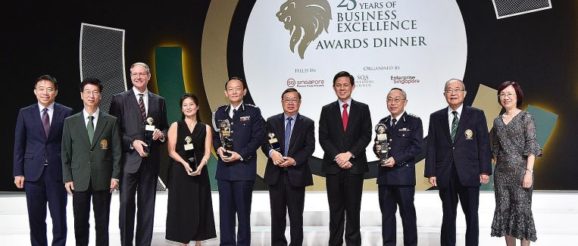S’pore firms must compete on innovation and quality: Chan

The multilateral trading system is under stress and Singapore can no longer take its access to overseas markets for granted, said Minister for Trade and Industry Chan Chun Sing yesterday. “This is going to be the new normal,” he added.
But there remain opportunities for Singapore businesses, which must compete not on price, but on quality and innovation.
Speaking at the 25th Business Excellence Awards ceremony at Resorts World Sentosa Convention Centre yesterday, Mr Chan cited the challenges for which Singapore must prepare. He said changes in the global economy would likely result in permanent shifts that have an enduring impact.
The US-China trade dispute has evolved beyond tariffs to areas such as technology, he said. “A trade deal is unlikely to solve the underlying tensions. A worst-case scenario would be if there is no trade deal and the US and China continue their tit-for-tat trade measures.”
The International Monetary Fund has estimated that US-China tariffs could cut global economic output by 0.8 percentage point next year.
These disruptions have emboldened other World Trade Organisation members to resolve bilateral issues using trade measures. Brexit has also added to the uncertainty, Mr Chan said.
To stay competitive, Singapore must adopt technology and be a trusted hub for intellectual property, he added. It also needs to translate research and development into commercial opportunities.
To do so, the Republic is building new linkages in digital identities and artificial intelligence through digital economy agreements. Partners include Chile and New Zealand, among others.
Companies that wish to upgrade and transform are also being given support, said the minister. An example is Scale-up SG, a 21/2-year programme that helps aspiring, high-growth companies scale rapidly and expand abroad.
The first 25 companies that began the programme in July have given positive feedback, Mr Chan said.
Singapore will also launch the Tech@SG programme in the fourth quarter of this year, to attract foreign tech talent and provide companies in growth areas with access to business networks.
Said the minister: “We cannot compete on the basis of price, but on quality and innovation. We are putting these in place so that we have a conducive environment for growth, and businesses are well equipped to compete in the new normal.”
These efforts have borne early fruit with companies such as ExxonMobil and Micron making long-term investments in Singapore, citing its strong intellectual property protection, skilled workforce and superior connectivity, he added.
Five organisations received awards at this year’s ceremony, organised by the Singapore Quality Award governing council and Enterprise Singapore. They are the Singapore Police Force, Singapore Prison Service (SPS), semiconductor manufacturer and tech firm ASM Technology Singapore, Marina Bay Sands (MBS) and the Maritime and Port Authority of Singapore.
ASM was recognised for its automotive and 5G technology solutions, while MBS used artificial intelligence to improve guest experience and increase productivity.
SPS was lauded for its seamless approach to rehabilitating and reintegrating offenders into society.
Enterprise Singapore chief executive Png Cheong Boon said business excellence becomes even more relevant as Singapore’s economy changes rapidly.
“Organisations that improve productivity and embrace innovation are in good stead to excel not just locally, but expand successfully into foreign markets as well.”
